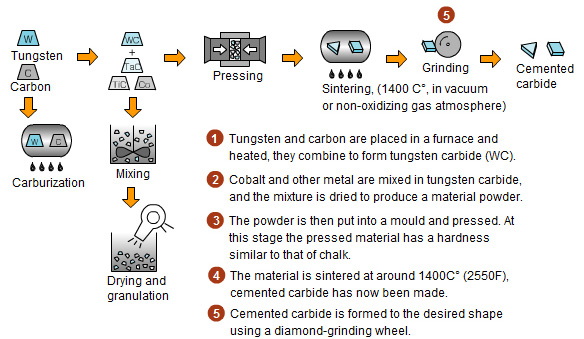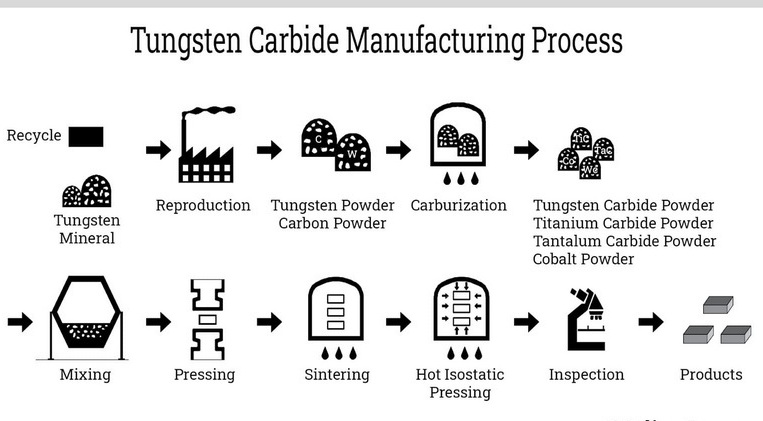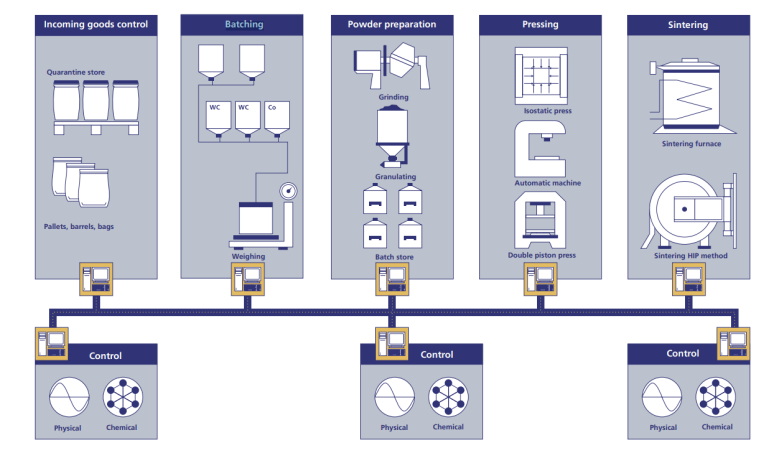Content Menu
● Introduction to Cast Tungsten Carbide
>> Chemical Composition
● Cast Tungsten Carbide Production Process
>> Raw Material Preparation
>> Mixing and Milling
>> Smelting
>> Casting
>> Post-Processing Treatments
● Factors Affecting Cast Tungsten Carbide Quality
● Applications of Cast Tungsten Carbide
● Advanced Techniques in Cast Tungsten Carbide Production
● Challenges and Future Developments
● Environmental Impact and Sustainability
● Conclusion
● Frequently Asked Questions
>> 1. What is the primary component of cast tungsten carbide?
>> 2. How does the grain size of tungsten carbide affect its properties?
>> 3. What are the common applications of cast tungsten carbide?
>> 4. How does the smelting temperature affect the quality of cast tungsten carbide?
>> 5. What role does cobalt play in cast tungsten carbide?
● Citations:
Cast tungsten carbide is a highly sought-after material in various industries due to its exceptional hardness, wear resistance, and high melting point. The production process of cast tungsten carbide plays a crucial role in determining its quality and performance. This article will delve into the intricacies of the cast tungsten carbide production process and explore how different stages impact the final product's quality.

Introduction to Cast Tungsten Carbide
Cast tungsten carbide is a composite material primarily composed of tungsten carbide (WC) particles bonded together with a metal matrix, typically cobalt. The combination of these components results in a material that is incredibly hard and resistant to wear, making it ideal for applications in industrial tools, military equipment, metallurgy, oil drilling, mining tools, and construction.
Chemical Composition
The chemical composition of cast tungsten carbide is critical to its performance. The material typically consists of tungsten carbide (WC) as the primary component, with cobalt (Co) serving as the binder. Other elements like nickel and chromium may also be added to enhance specific properties such as corrosion resistance and toughness.
Cast Tungsten Carbide Production Process
The production of cast tungsten carbide involves several key stages: raw material preparation, mixing, smelting, casting, and post-processing treatments.
Raw Material Preparation
The quality of raw materials is fundamental to the production of high-quality cast tungsten carbide. Tungsten powder and carbon black are mixed in precise proportions to form tungsten carbide (WC) through a carburization process. Cobalt powder is added as a binder to enhance toughness and reduce brittleness.
Mixing and Milling
After carburization, the WC powder is mixed with cobalt and other alloying elements. The mixture is then milled to ensure uniform particle distribution, which is crucial for achieving consistent properties in the final product.
Smelting
Smelting is a critical step where the mixed powder is melted at high temperatures (typically above 2700°C) in an inert atmosphere to prevent oxidation. The smelting process must be carefully controlled to ensure complete melting and uniform mixing of the components.
Casting
The molten alloy is then cast into molds designed to withstand high temperatures. The casting process requires precise control over temperature and cooling rates to achieve uniform solidification and minimize defects.
Post-Processing Treatments
After casting, the material may undergo additional treatments such as heat treatment or machining to refine its microstructure and enhance mechanical properties.
Factors Affecting Cast Tungsten Carbide Quality
Several factors during the production process can significantly impact the quality of cast tungsten carbide:
- Raw Material Quality: High-purity raw materials are essential for minimizing impurities and ensuring consistent properties.
- Smelting Conditions: Temperature, atmosphere, and smelting time must be precisely controlled to achieve a homogeneous melt.
- Casting Techniques: Uniform cooling rates and mold design are crucial for preventing defects and achieving desired microstructures.
- Post-Processing Treatments: Heat treatment and machining conditions can further refine the material's properties.

Applications of Cast Tungsten Carbide
Cast tungsten carbide is widely used in various industries due to its exceptional properties:
- Industrial Tools: Cutting tools, wear parts, and other machinery components benefit from its hardness and wear resistance.
- Military Equipment: Used in kinetic energy penetrators and other applications requiring high density and hardness.
- Metallurgy: Employed in high-wear applications such as mining and drilling tools.
- Oil Drilling: Used in drill bits and other equipment due to its ability to withstand harsh conditions.
- Construction: Enhances the efficiency and durability of building material processing tools.
Advanced Techniques in Cast Tungsten Carbide Production
Recent advancements in production techniques have further improved the quality and efficiency of cast tungsten carbide manufacturing:
- Vacuum Sintering: This method allows for the production of parts with complex geometries while maintaining high density and uniformity.
- Hot Isostatic Pressing (HIP): Enhances the material's density and reduces porosity, leading to improved mechanical properties.
- 3D Printing: Enables the creation of complex shapes that are difficult to achieve with traditional casting methods.
Challenges and Future Developments
Despite its advantages, the production of cast tungsten carbide faces challenges such as high energy consumption and environmental concerns. Future developments are likely to focus on more sustainable production methods and the integration of advanced materials to enhance performance.
Environmental Impact and Sustainability
The production of cast tungsten carbide involves processes that can have significant environmental impacts, such as energy consumption and waste generation. Efforts to reduce these impacts include the development of more efficient smelting techniques and the recycling of tungsten carbide scrap.
Conclusion
The production process of cast tungsten carbide is complex and requires meticulous control over each stage to ensure high-quality products. By understanding the impact of raw material selection, smelting conditions, casting techniques, and post-processing treatments, manufacturers can optimize their processes to produce cast tungsten carbide that meets the stringent demands of various industries.

Frequently Asked Questions
1. What is the primary component of cast tungsten carbide?
Cast tungsten carbide is primarily composed of tungsten carbide (WC) particles bonded with a metal matrix, typically cobalt.
2. How does the grain size of tungsten carbide affect its properties?
Smaller grain sizes increase hardness and wear resistance, while larger grains enhance toughness. The choice of grain size depends on the specific application requirements.
3. What are the common applications of cast tungsten carbide?
Cast tungsten carbide is used in industrial tools, military equipment, metallurgy, oil drilling, mining tools, and construction due to its exceptional hardness and wear resistance.
4. How does the smelting temperature affect the quality of cast tungsten carbide?
The smelting temperature must be sufficiently high to ensure complete melting and uniform mixing of components. Incorrect temperatures can lead to defects and inconsistent properties.
5. What role does cobalt play in cast tungsten carbide?
Cobalt acts as a binder, enhancing the toughness and reducing the brittleness of the material. The cobalt content can be adjusted to balance hardness and toughness according to specific application needs.
Citations:
[1] https://www.carbide-products.com/blog/tungsten-carbide-production-process/
[2] https://www.zzbetter.com/new/Quality-Control-of-Tungsten-Carbide-Rods.html
[3] https://patents.google.com/patent/US5089182A/en
[4] https://www.youtube.com/watch?v=95yS7W66-BI
[5] https://www.tungco.com/insights/blog/frequently-asked-questions-used-tungsten-carbide-inserts/
[6] https://www.yatechmaterials.com/en/news/production-process-and-equipment-of-tungsten-carbide-powder/
[7] https://met3dp.sg/th/casting-tungsten-carbide-best-bet-superior-toughness/
[8] https://www.retopz.com/how-to-check-the-quality-and-precision-of-tungsten-carbide-tools/
[9] https://www.linkedin.com/pulse/tungstencarbide-production-process-tungsten-carbide-zzbettercarbide
[10] https://patents.google.com/patent/CN1546713A/en
[11] https://consolidatedresources.com/blog/10-facts-about-tungsten-carbide/
[12] https://www.carbide-part.com/blog/comprehensive-analysis-of-tungsten-carbide-components-2/
[13] https://eureka-patsnap-com.libproxy1.nus.edu.sg/blog/what-is-tungsten-carbide/
[14] https://tuncomfg.com/about/faq/
[15] https://www.linkedin.com/pulse/tungsten-carbide-production-shijin-lei
[16] https://www.linde-amt.com/resource-library/articles/tungsten-carbide
[17] http://tungsten-powder.com/spherical-cast-tungsten-carbide-powder-producing-method.html
[18] https://konecarbide.com/quality-control/
[19] https://www.techlinkcenter.org/news/manufacturing-tungsten-carbide-is-hard-so-the-army-research-lab-figured-out-how-to-3d-print-it
[20] https://m.ihrcarbide.com/news/the-impact-of-tungsten-carbide-process-on-quality/
[21] https://www.samaterials.com/tungsten-carbide/1106-casting-tungsten-carbide-powder.html
[22] http://www.metalspiping.com/cast-tungsten-carbide-powder.html
[23] https://www.zgjrdcc.com/tungsten-carbide-quality-control/
[24] https://www.zccfcarbide.com/Mobile/MArticles/theimpacto.html
[25] https://www.sciencedirect.com/science/article/abs/pii/S0263436823003475
[26] https://www.linkedin.com/pulse/quality-checking-tungsten-carbide-rods-shijin-lei
[27] https://stock.adobe.com/search?k=tungsten+carbide
[28] https://stock.adobe.com/search?k=carbide
[29] https://www.psmindustries.com/yillik/tungsten-carbide-manufacturing-process
[30] http://news.chinatungsten.com/en/tungsten-jewelry-price/46-tungsten-news-en/tungsten-information/101545-ti-12933.html
[31] http://www.metalspiping.com/cast-spherical-tungsten-carbide-powder.html
[32] https://ceramics.org/ceramic-tech-today/tungsten-carbide-made-easy-government-industry-academia-investigate-additively-manufacturing-cemented-carbide-parts/
[33] https://craftstech.net/category/tungsten-carbide/
[34] https://www.youtube.com/watch?v=AB5by8bDPFE
[35] https://www.sciencedirect.com/science/article/pii/S2238785424008433
[36] https://www.linkedin.com/pulse/how-does-tungsten-carbide-material-made-candy-cao-ufwxc
[37] https://www.kennametal.com/us/en/products/Metal-Powders-Materials-Consumables/tungsten-carbide-powders.html
[38] https://www.retopz.com/57-frequently-asked-questions-faqs-about-tungsten-carbide/
[39] https://www.reddit.com/r/EngineeringPorn/comments/493mgb/tungsten_carbide_how_they_make_it/
[40] https://rocklinmanufacturing.com/blog/2022/5/18/rocklin_mfg/frequently_asked_questions_about_rocklinizing/ar/94/
[41] https://www.practicalmachinist.com/forum/threads/machining-tungsten-carbide-advice-needed.351332/
[42] https://www.indiabix.com/mechanical-engineering/production-engineering/discussion-3979
[43] https://www.metcojoiningcladding.com/ecoma/files/DSM-0245_PlasmaDur_CTC_Ni-Cr-BSi.pdf?download=true
[44] https://www.sandvik.coromant.com/en-us/services/recycling/faq-carbide-recycling
[45] https://www.generalcarbide.com/wp-content/uploads/2019/04/GeneralCarbide-Designers_Guide_TungstenCarbide.pdf
[46] https://www.eng-tips.com/threads/question-regarding-tungsten-carbide-brazing.293005/
[47] https://www.bladeforums.com/threads/tungsten-carbide-question.524307/
[48] https://www.reddit.com/r/metalworking/comments/9ftns7/can_you_cast_or_forge_tungsten/
[49] https://www.cnczone.com/forums/metalwork-discussion/226048-quot-machine-quot-tungsten-carbide.html
[50] http://www.zy-tungsten.com/en/ArticlePage.aspx?class1=4&class2=25
[51] https://generalcarbide.com/pdf/General-Carbide-Designers-Guide-Tungsten-Carbide.pdf
[52] https://www.youtube.com/watch?v=wQwc5-mg4B4
[53] https://www.kovametalli-in.com/manufacturing.html
[54] https://en.wikipedia.org/wiki/Tungsten_carbide
[55] https://www.youtube.com/watch?v=L7nxS4AjRws
[56] http://www.tungsten-powder.com/urltra-fine-tungsten-carbide-powder-process.html
















